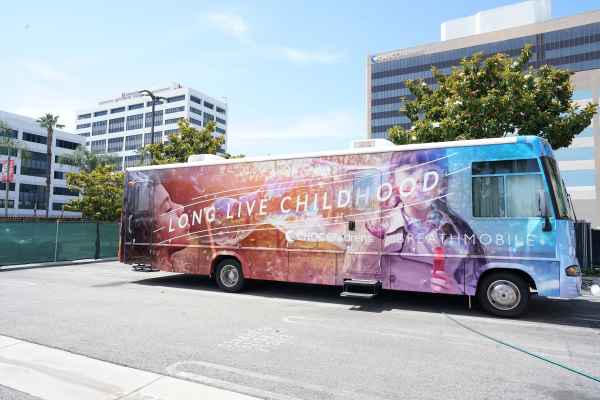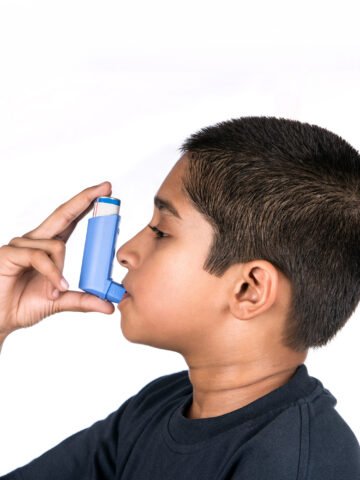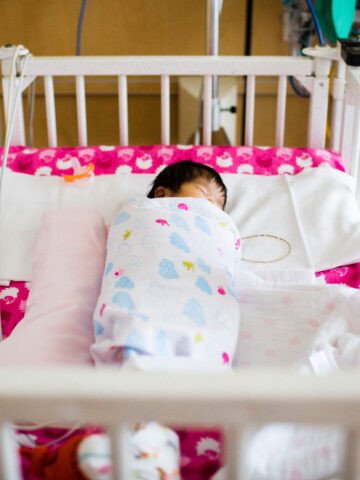A first-of-its-kind, large-scale national study conducted by a CHOC team concludes that asthma in children may worsen after a COVID-19 infection.
The study, recently published in the Journal of Allergy and Clinical Immunology: In Practice, is the first to demonstrate a worsening of asthma outcomes in children during the six months following a PCR-confirmed COVID-19 infection, says Dr. Christine Chou, lead author and pediatrician who is a provider in CHOC’s Breathmobile program.
Two of Dr. Chou’s CHOC colleagues, Louis Ehwerhemuepha, PhD, who leads the research data science program, and Dr. Stanley Galant, a pediatric allergist specializing in asthma, and founder and former director of Breathmobile, worked on the study. The fourth author is biostatistician Tricia Morphew, of Morphew Consulting in Bothell, Wash.
Previous studies by other researchers showed that children with asthma enjoyed a dramatic reduction in asthma-related issues during the first year of the pandemic (March 2020 to March 2021), likely because stay-at-home orders, masking and other public health measures kept exposure to respiratory viral triggers in check, Dr. Chou and Dr. Galant say.
“We weren’t seeing a lot of kids with asthma issues in that first year of the pandemic, so that sparked our interest,” Dr. Chou says of the impetus for the study. “We wanted to really tease out if COVID really wasn’t asthmogenic.”
Turns out it was.
The study of nearly 62,000 children with asthma who tested positive for COVID-19 showed they had significantly more asthma visits, hospitalizations, emergency inhaler use and steroid treatments during the six months after their illness compared to children who tested negative.

Children who tested negative for COVID-19 had improved asthma control for the next six months, meaning fewer emergency department visits and hospitalizations for asthma, and less asthma treatment, Dr. Chou says.
“We saw the longer-lasting harm of COVID on kids’ asthma control, despite the overall impression that kids were doing well with their asthma control during the first year of the pandemic,” Dr. Galant says.
“The research project that Dr. Chou led clearly shows this in the methodology we put together with a nice negative control group that was critical for understanding what happened in the affected group,” he adds. “For our asthma patients, we’ve always pushed for flu vaccines so this gives us some objective reasoning why it’s important to also stay protected against COVID-19.”
The CHOC study included 108 pediatric healthcare systems in the U.S. and examined 61,916 asthmatic children ages 2 to 17.9 who tested for COVID-19 from March 2020 through February 2021.
The patients included a diversity of ethnicities, Dr. Galant notes.
“Future studies we are considering may stratify kids by ethnicity,” he says.
Several other asthma studies underway
The new study is among several research efforts concerning asthma completed, underway, and planned.
Last year, for example, Dr. Olga Guijon, who previously directed the Breathmobile, the only mobile asthma clinic dedicated to serving preschool and school-aged children in Orange County, published a paper that discussed the epidemiology of COVID-19 when asthmatic kids stayed home.
Dr. Guijion advises parents of children with asthma about the COVID-19 vaccine.
Nurse practitioner Linda Mendoza is studying remote medical monitoring, Dr. Galant says, and another paper in progress looks at whether controller medication, primarily inhaled corticosteroids, and age can influence the effect of COVID-19 on causing asthma exacerbations.
“If I were a doctor caring for an asthmatic patient with COVID,” Dr. Galant says, “should I recommend continuing their inhaled corticosteroids? The general recommendation is to continue this therapy to prevent exacerbations, and our preliminary data supports this.”
For more about the Breathmobile Asthma Clinic at CHOC




